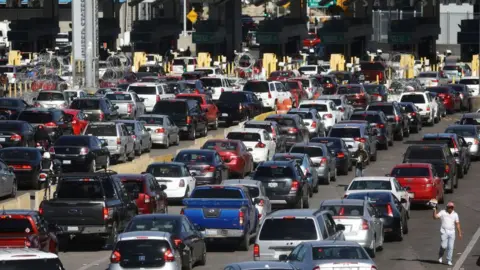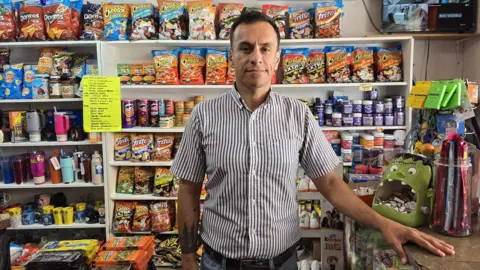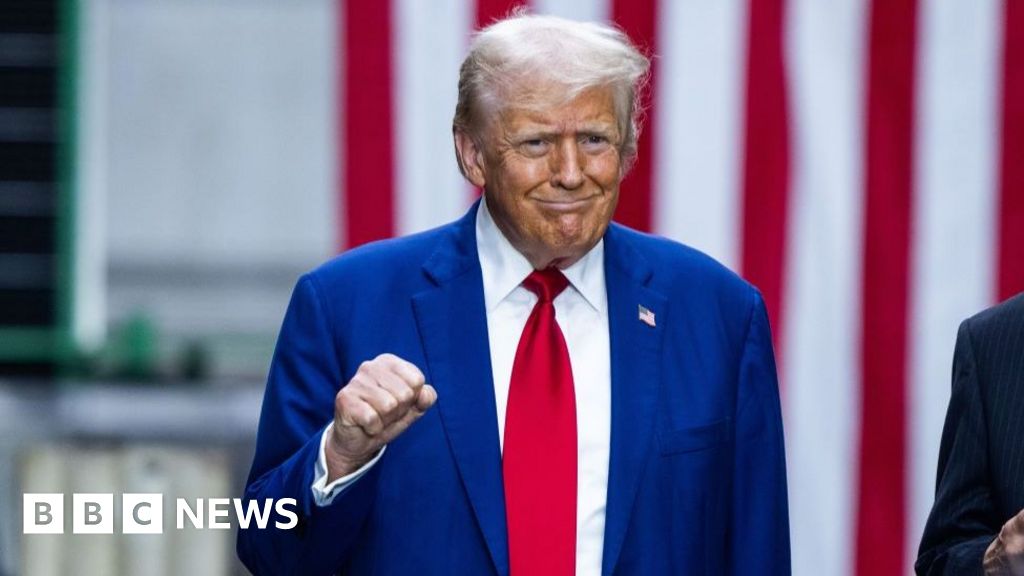ARTICLE AD BOX

 Getty Images
Getty Images
The Peace Bridge between Port Erie, Ontario, and Buffalo, New York, carries more than one million trucks, and more than five million cars, every year
As Americans prepare to vote for their next president, Canadians and Mexicans are watching on nervously.
For some Canadians living next to the US border, politics isn’t a topic often discussed.
“You don't talk politics and you don't talk religion,” says 85-year-old Ernie, who lives in the Canadian town of Fort Erie, just across the Niagara River from Buffalo, New York.
Yet for others in Fort Erie, Ontario, politics can come up, especially after a few beers, and with a US presidential election fast approaching.
A short walk from the Peace Bridge that connects the two countries is Southsides Patio Bar & Grill, where US-born bartender Lauren says she frequently has to break up political arguments.
“It happens, especially after a few drinks. Everybody's voice is heard here,” she laughs while shaking her head.
Some 2,000 miles (3,200 km) southwest in the Mexican border city of Juarez, Sofia Ana is in the Monday morning queue of cars waiting to cross to El Paso, Texas for work.
"There's better employment opportunities in the US, there's better benefits,” she explains.
Ana is one of an estimated 500,000 Mexicans who legally cross the border into the US every week day.
It is in their interest that relations between the two countries remain cordial. “It affects us deeply… it is very intense,” adds Ana from her car window.
With more than 155 million Americans due to vote in the US presidential election on 5 November, it is fair to say that the outcome will be felt well beyond the US. No more so than its largest trading partners Canada and Mexico.
The two-way trade of goods between the US and Mexico totalled $807bn (£621bn) last year, making Mexico the US’s biggest trading partner when it comes to physical items.
Meanwhile, the US’s goods trade with Canada in 2023 was in second place on $782bn. By comparison the figure for the US and China was $576bn.

 Getty Images
Getty Images
More than half a million Mexicans legally travel into the US every day, mostly by car
Mexico and Canada’s future trade with the US could be impacted if Donald Trump wins the US election. This is because he is proposing to introduce substantial import tariffs. These would be 60% for goods from China, and 20% on products from all other countries, apparently including Mexico and Canada.
By contrast, Kamala Harris is widely expected to maintain the current more open trade policies of President Biden. This is despite the fact she voted against the 2020 United States Mexico Canada Agreement (USMCA) free trade deal, saying it didn’t go far enough on tackling climate change.
Trump and Harris have “starkly different visions for the future of US economic relations with the world”, said one study in September.
Back in Juarez, shop owner Adrian Ramos says that US political instability is something business owners like himself have had to get used to. “We’ve seen it all,” he says.
Mr Ramos adds that the result in the US on 5 November will likely impact on his business whoever wins. “If Trump wins, it's going to take longer to cross over to the States, if Harris wins, it may not, but there will be changes depending on who wins.”


Mexican shop owner Adrian Ramos says that Mexicans will be affected by the US election result no matter who wins
In the rural Canadian township of Puslinch, Ontario, beef farmer Dave Braden is definitely more concerned about Trump returning to the White House.
“The worry with Trump is that he'll introduce a policy [such as tariffs], and just say ‘get on with it’ and that is threatening,” says Mr Braden, standing between hay bales in front of one of his cattle fields.
“I think with Harris, we have the assumption that she will recognize the relationship between the two countries and we will work together.”
The Canadian Chamber of Commerce is also concerned about the possibility of a second Trump presidency introducing new tariffs. It calculated that tariffs of 10% on Canadian imports (a level that Trump has previously suggested), would cost each Canadian and American $CA1,100 ($800; £615) per year.
The Canadian government has reportedly been talking to Trump’s camp to try to exempt Canada in the event that he does win the election.
Not every Canadian has such fears about Trump though. One Ontario farmer who is supporting him didn’t want to speak on the record, but says he believes the former president is stronger on the economy, which would benefit Canada.
For Georganne Burke, the Republicans Overseas chapter leader for Canada, it’s no surprise that some Trump supporters don’t speak publicly about him. She says that backing Trump is “not a popular position to be in”.
Recent polling suggests that Harris is significantly more popular than Trump among Canadians.
The USMCA, which was negotiated in 2018 under Trump’s presidency, is up for renegotiation in 2026.
With that on his mind, Canada’s Minister for Innovation, Science and Industry Francois Champagne tells the BBC he is checking the US election polls daily.
“Because this is such a valued relationship. It’s why I call it this indispensable relationship, because when you look at everything, you realise how indispensable we are to each other,” he explains.
In the run up to the election Mr Champagne is spending time meeting American counterparts of both parties. In his words “connecting the dots”.
“For example, when I meet the governor of South Carolina, which has a plant in the auto sector, I remind him that a lot of the critical minerals are coming from Canada,” he says. “So, it's making sure that everyone understands that we are joint at the hip in terms of security, supply chain, but also a growth agenda for North America.”


Beef farmer Dave Braden
Lila Abed, an expert on US-Mexico relations, says that whatever November’s outcome, “there will be three essential topics on the bilateral agenda with Mexico that are going to have to be dealt with immediately” – migration, security and trade.
“It is telling that [new Mexican president] Claudia Sheinbaum hasn't designated Mexico's ambassador to the US,” adds Ms Abed, who is director of the Mexico Institute at the Washington-based Wilson Centre think tank.
“I don't believe that will be announced until after the US presidential election, because she wants to take into consideration what kind of individual she wants in Washington after the result.”
Looking ahead to 2026, Ms Abed believes the USMCA renegotiation will focus on US efforts to stop increased Chinese investment in Mexico.
"Where Republicans and Democrats actually coincide is on trying to stem or trying to stop Chinese investment in Mexico, which is something that both political parties in the United States are very concerned about,” she says.
“While I believe that, you know, the tone and the policies will naturally differ depending on who wins the White House, I do believe that the main issues on the bilateral agenda will remain.”
Additional reporting by Vianey Alderete.
Read more global business and tech stories

 2 months ago
15
2 months ago
15








 English (US) ·
English (US) ·